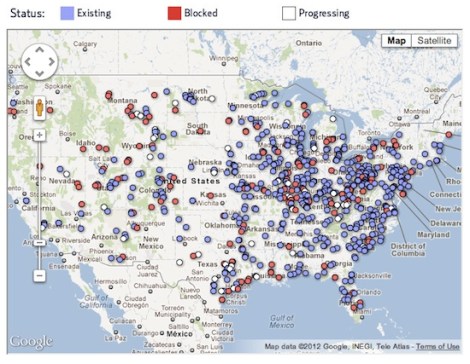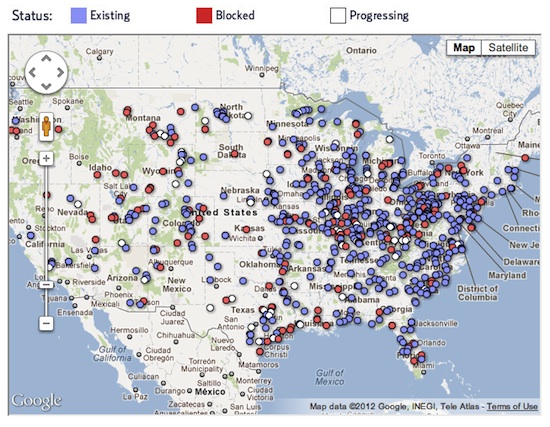
In Mother Jones, Mark Hertsgaard makes the case for the Sierra Club’s anti-coal campaign as “the most significant achievement of American environmentalists since the passage of the Clean Air Act and Clean Water Act,” as one source puts it. The group has shut down proposals for 166 coal-fired power plants (check out the map above or here). The key? The group was working outside of Washington, with the grassroots:
The movement’s center of gravity was in the South and Midwest, “places like Oklahoma and South Dakota, not the usual liberal bastions where you’d expect environmental victories,” [Mary Anne Hitt, the director of the Sierra Club’s Beyond Coal campaign] recalls …
[E]conomic trends only made coal somewhat vulnerable, argues Tom Sanzillo, a former New York state deputy comptroller who has worked with the Beyond Coal campaign; it was grassroots activism that leveraged vulnerability into outright defeat. The movement’s strength was grounded in retail politics—people talking with friends and neighbors, pestering local media, packing regulatory hearings, protesting before state legislatures, filing legal challenges, and more. The movement had no official membership rolls; it was populated by clean energy advocates, public health professionals, community organizers, faith leaders, farmers, attorneys, [and] students …
Ironically, as the Sierra Club was galvanizing the grassroots against coal, it was catching backlash from anti-fracking activists for being overly friendly with the natural gas industry. That alliance — based on the the enemy-of-my-enemy-is-my-friend principle — involved millions of dollars flowing from the natural gas industry to the Sierra Club, and when news of the partnership leaked out earlier this year, it promoted environmental writer and advocate Sandra Steingraber to write a break-up letter to the club:
The hard truth: National Sierra Club served as the political cover for the gas industry and for the politicians who take their money and do their bidding. It had a hand in setting in motion the wheels of environmental destruction and human suffering. It was complicit in bringing extreme fossil fuel extraction onshore, into our communities, farmlands, and forests, and in blowing up the bedrock of our nation. And I can’t get over it.
The Sierra Club’s hardened its stance against natural gas somewhat, but not as much as anti-fracking advocates would like. It also still has work to do shutting down old coal-fired plants. If the group doesn’t have the resources to fight both coal and natural gas, one would hope that the anti-fracking grassroots could adapt the successful anti-coal strategies to the their own cause.



